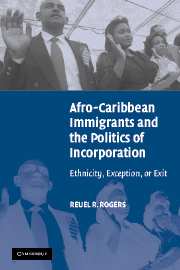How are Afro-Caribbean immigrants integrated into the American political process? More precisely, how does race affect the political incorporation process for this group of foreign-born blacks? This question lies at the heart of this study. In the vernacular of the social sciences, political incorporation is the key dependent variable under scrutiny. The standard descriptive measures of political incorporation include naturalization rates, registration and voting data, party affiliation, and elective officeholding. Although this study devotes some attention to these important outcome measures, the focus is directed less on the outcomes and more on the process of political incorporation itself.
More pivotal to this study are the identities, interests, ideological agendas, and strategies that inform and animate the process for Afro-Caribbean immigrants. The aim is to provide a critical account of how Afro-Caribbean political integration has unfolded and how their experiences compare with those of African Americans and European immigrant groups. The study explores how these black immigrants relate to the political process, conceive of their political interests, view themselves, see themselves in relation to other groups, and make sense of the political world.
This last series of questions brings me to another important point about the analytic focus of this study. The project is necessarily concerned with race, ethnicity, self-definitions, and group identities. This book, as I noted at the outset, seeks to understand how race affects the political incorporation process.
